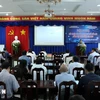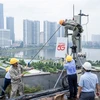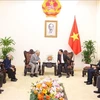Hoang Anh Tuan, Director General of the Vietnam Atomic Agency, tells Ha Noi Moi (New Ha Noi) newspaper that Vietnam will only develop its nuclear energy when conditions are mature.
He said following the Fukushima incident in Japan in April 2011, many countries expressed concerns about the safety of nuclear plants. Germany even declared that by 2020 there would be no nuclear power plants in that country.
However, in reality the number of nuclear power plants in operation following the Fukushima incidents remains almost the same. Nuclear energy now accounts for about 11 percent of energy consumption world wide - and energy demand is increasing. This is a strong indication that nuclear energy will keep developing.
According to the scientist, in the current context of global warming, nuclear energy is still the best option as it does not create a greenhouse effect, one of the factors blamed for climate change. In addition, the cost of nuclear energy in many countries is cheaper than that of coal-fired energy, geo-energy, wind energy or hydro energy.
He noted that the IAEA believes the tendency for more nuclear power development will increase rapidly.
Discussing the construction process of the Ninh Thuan Nuclear Power Plant 1, the scientist said under the National Assembly Resolution 41/2009/QH 12, the ground breaking ceremony for the Ninh Thuan Nuclear Power Plant 1 was to be launched in 2014 and the first generator will be put into operation in 2020. However, by now the site of the plant and investment is still in the process of completion and approval.
In addition, following the Fukushima incident, the government has asked agencies to come up with the most up to date safety designs and technology for the plant. That's why construction will only start when all safety conditions are available. This is the reason for the delay.
Tuan said at present, owner of the Ninh Thuan nuclear project, Electric Viet Nam Corporation (EVN), is working with consultants on the location of the project and investment. In addition, EVN has presented to the Ministry of Science and Technology a report on project safety.
It has also presented a report on environmental assessment to the Ministry of Natural Resources and Environment - and a report on general activities to the Ministry of Planning and Investment. However, there remains quite a lot of work to be done. Hopefully, next year the final proposal will be presented to the National Assembly for approval, according to the Director General of the Vietnam Atomic Agency.
He told the newspaper that it is projected that about 440 university and post university graduates, plus 460 graduates from colleges and 200 technicians will be needed to run the nuclear power plant. From 2010 to 2014, the Ministry of Education and Training sent 323 students to Russia to study nuclear power plants. Another 10 graduates were sent to further their degrees on nuclear energy.
In the same period, EVN also sent 30 students to study nuclear energy in Japan and Russia. In addition, the Ministry of Science and Technology has regularly organised short courses on nuclear energy for staff working in the field, including people in public relations.-VNA
He said following the Fukushima incident in Japan in April 2011, many countries expressed concerns about the safety of nuclear plants. Germany even declared that by 2020 there would be no nuclear power plants in that country.
However, in reality the number of nuclear power plants in operation following the Fukushima incidents remains almost the same. Nuclear energy now accounts for about 11 percent of energy consumption world wide - and energy demand is increasing. This is a strong indication that nuclear energy will keep developing.
According to the scientist, in the current context of global warming, nuclear energy is still the best option as it does not create a greenhouse effect, one of the factors blamed for climate change. In addition, the cost of nuclear energy in many countries is cheaper than that of coal-fired energy, geo-energy, wind energy or hydro energy.
He noted that the IAEA believes the tendency for more nuclear power development will increase rapidly.
Discussing the construction process of the Ninh Thuan Nuclear Power Plant 1, the scientist said under the National Assembly Resolution 41/2009/QH 12, the ground breaking ceremony for the Ninh Thuan Nuclear Power Plant 1 was to be launched in 2014 and the first generator will be put into operation in 2020. However, by now the site of the plant and investment is still in the process of completion and approval.
In addition, following the Fukushima incident, the government has asked agencies to come up with the most up to date safety designs and technology for the plant. That's why construction will only start when all safety conditions are available. This is the reason for the delay.
Tuan said at present, owner of the Ninh Thuan nuclear project, Electric Viet Nam Corporation (EVN), is working with consultants on the location of the project and investment. In addition, EVN has presented to the Ministry of Science and Technology a report on project safety.
It has also presented a report on environmental assessment to the Ministry of Natural Resources and Environment - and a report on general activities to the Ministry of Planning and Investment. However, there remains quite a lot of work to be done. Hopefully, next year the final proposal will be presented to the National Assembly for approval, according to the Director General of the Vietnam Atomic Agency.
He told the newspaper that it is projected that about 440 university and post university graduates, plus 460 graduates from colleges and 200 technicians will be needed to run the nuclear power plant. From 2010 to 2014, the Ministry of Education and Training sent 323 students to Russia to study nuclear power plants. Another 10 graduates were sent to further their degrees on nuclear energy.
In the same period, EVN also sent 30 students to study nuclear energy in Japan and Russia. In addition, the Ministry of Science and Technology has regularly organised short courses on nuclear energy for staff working in the field, including people in public relations.-VNA



















